Il Gattopardo
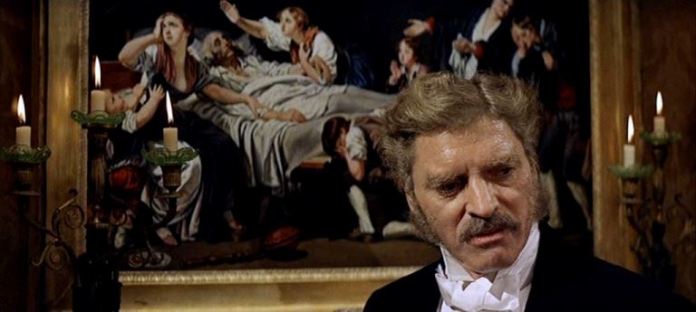
Director: Luchino Visconti
By Roderick Heath
Luchino Visconti was a singular and contradictory figure in just about any context. Visconti’s background was dauntingly aristocratic. His father belonged to a branch of the once very powerful Visconti family of Milan, whilst his mother was heiress to a cosmetics fortune. In the midst of Fascist Italy’s halcyon days, however, Visconti stood as a committed Marxist and out homosexual. Raised as an aesthete, he staged lush grand operas whilst directing films that helped define that most stringent and fundamental of film styles, neorealism. The disparities of Visconti’s experience and perspective armed him with a fearsome artistic arsenal, the intellectual and aesthetic reach to encompass the extremities of his age. Visconti started his film career working as an assistant director for Jean Renoir. When he returned home at the start of World War II, Visconti, like everyone else who wanted to work in the Italian film industry, had to labour under the auspices of the state, joining a unit under Benito Mussolini’s son Vittorio that also included Federico Fellini. Visconti gave neorealism its first, vital gambit with Ossessione (1942), and the movement soon bloomed, flourished, and peaked amidst the rubble and poverty of the postwar state, as Visconti was joined by Roberto Rossellini and Vittorio De Sica as the triumvirate of major neorealist directors. As the country and its film industry got back on their feet and the filmmakers who had become famous through the movement felt the changing tides of art and industry, neorealism began to evolve. Some saw this evolution as an inherent betrayal of neorealism’s early purity, given the political ideals the movement strove to express. Visconti seemed to be drifting farthest away from his early brief, as his work became increasingly formalistic, his subject matter leaned toward the historical and the literary, and his productions became increasingly international.

But the underpinnings of neorealism, with its sociological fascination for ways of life and lucidly detached method of storytelling, continued to be the lifeblood of much Italian cinema for years afterward. Visconti began with Senso (1954) to effect a complex blending of the opposing facets of his artistic persona—the florid and rigorous, the ironic and the fulsome—that took his old style to new places. Senso sketched much of what The Leopard would later develop, depicting the largeness of history in sarcastic contrast with the smallness of people caught up in it and evoking a classically romantic melodrama only to subvert and degrade it, alternating breathlessly florid staging and coolly choreographed, dissembling camerawork. The quietly radical Senso was viewed as a problematic work on first release, but Visconti rebounded with La Notte Bianche (1957) and Rocco and his Brothers (1960), the latter a soaring epic that sought to invest a tale of everyday calamity with the outsized intensity of a Verdi opera. Visconti’s next project was The Leopard, a deliberate antistrophe from the previous film’s focus and tone. The Leopard took on a then-recent cause célèbre, adapting a novel by Sicilian aristocrat Giuseppe di Lampedusa, who had died before his book’s publication. Lampedusa’s material was his own family history tracking back to the days of Garibaldi and the Risorgimento, blended with his own feelings of antagonism and displacement in the 20th century. Visconti surely felt sympathetic with the novel’s sad, dislocated view of the decline of his class’s influence, and also its vein of unsentimental clarity, its finite blend of tragically inflected romantic nostalgia and biting commentary. Much like Renoir’s The Grand Illusion (1938), The Leopard is partly an expression of regret at the loss of the best qualities of an age in the face of a ruder, cruder time.

Finding an actor to play Lampedusa’s hero, Don Fabrizio Corbera, Prince of Salina, wasn’t the smallest of Visconti’s challenges. Eventually Burt Lancaster was pressed on Visconti by his producers, whilst Visconti retained Alain Delon and Claudia Cardinale, who had gained major career boosts in Rocco and His Brothers. Lancaster’s stern height and leonine visage proved to be crucial, for the part required an actor with great talent and presence, whilst the realities of the production demanded a big star. Visconti’s opening scene is a particularly dense series of signs, most of which are conveyed not through dialogue but through visuals and non-specific sounds: the camera closes in on the palazzo of the Corberas like a visitor stealing in through the orchards and craning an ear to tune in the sound, eventually entering the house to find the family and household at their Sunday prayers administered by the estate’s resident priest Father Pirrone (Romolo Valli). The chants and catechisms of the prayers evoke a ritual probably unchanged in the 400 years the Corberas have been in Sicily and before, but now is interrupted all too tellingly by the sounds of a commotion outside: the dead body of a soldier has been found on the estate. The soldier’s garb marks him as a follower of Garibaldi, who has just landed his force of volunteers in Sicily to wage a campaign to unify the country under the House of Savoy, signalling the commencement of a civil war. The careful colour composition turns the sight of the soldier’s grim death into a pietà depicting devoted sacrifice, clawing at the red earth of the Corbera estate as a last gesture of trying to claim it for the cause.
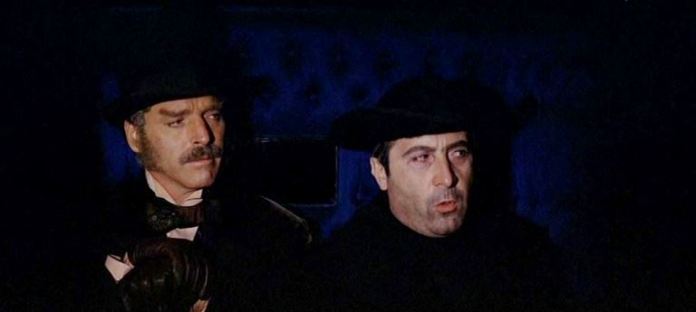
This touch echoes the opening sequences of Senso, where a similarly orchestrated use of colour coding announced political events. This breaking of the peace terrifies some, including the Prince’s high-strung wife, Princess Stella (Rina Morelli), but Fabrizio immediately announces his intention to go into Palermo to find out what’s going on and invites Pirrone to accompany him: Pirrone knows perfectly well that the Prince is actually using the event as an excuse to visit his favourite prostitute. Quickly, both the surfaces and contradictions of this little world have been confirmed, the tight intertwining of role and individuality, state and religion, officious idealism and carefully cultivated hypocrisy, and the way great public events become excuses for personal escapades. After the Prince’s nocturnal adventuring, Pirrone and Fabrizio carefully quarrel as the priest presses the Prince to confess his sins and Fabrizio defends himself as having made the best of a terrible marriage. This shades into a political argument in which Pirrone admonishes the Prince for even giving slight contemplation to a future settlement with the revolutionaries, concerned that the new regime will surely set out to break the church’s power and sell off its land. Their arguments are laced with concessions to different kinds of power, moral versus temporal and fiscal, as the Priest holds off from admonishing the Prince too sternly because he knows which side his bread’s buttered on, whilst Fabrizio feels the bite of Pirrone’s conviction nonetheless.

The crucial moment of the film’s first half comes when Fabrizio is having his morning shave after his return, and his nephew, Tancredi Falconeri (Delon), enters the room: Visconti carefully frames the entrance so that Tancredi’s face is caught in Fabrizio’s shaving mirror, capturing him just for a moment as the image of Fabrizio’s own sense of youth. Tancredi announces his intention to join up with Garibaldi’s Redshirt volunteers, distressing the Prince at first, but Tancredi argues that Garibaldi’s mission is preferable to a republican alternative that will completely strip the waning aristocracy of its influence, and delivers a shibboleth of import: “For things to stay the same, things will have to change.” Fabrizio comprehends Tancredi and sends him on his way in a swooningly romantic vision of youthful mission, Tancredi riding away from the palazzo to battle amidst Nino Rota’s swelling music, leaving behind relatives who, apart from the Prince, barely seem to know anything’s happening. Visconti stages a cold cut from Fabrizio and Pirrone’s argument to the midst of a street battle as the Redshirts fight Bourbon troops for control of Palermo. Visconti shoots this vignette of violent spectacle, the one traditional moment of epic largesse in the film, largely in long shots that study the masses of fighters rather than individuals, as contrasts of energy and poise, with the Garibaldi supporters swarming in masses of roiling, messy numbers, countered by crisp, neatly advancing lines of the royalist soldiers (a touch mimicked by fan Martin Scorsese in the climax of his Gangs of New York, 2002).
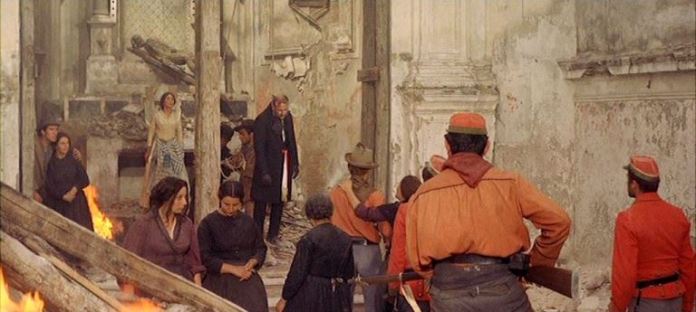
Amidst the fighting, Visconti picks out a gruesome, antiheroic study in oppression and reaction, as a suited bureaucrat oversees the execution of several revolutionaries, only to be chased down himself by an enraged plebeian citizenry who lynch him in a public square. This vignette is probably the moment most reminiscent of classic neorealist technique in the film, recalling Rossellini’s Rome: Open City (1945) and evoking the landscape of vicious civic coercion and reprisal that led to Mussolini’s hanging before a crowd. Visconti obviously intends a likeness here, but not just the usual vague connection of the historical made relevant one finds in historical films; here is a thesis in miniature, the essence of Visconti’s political and personal theme of cycles. Visconti films the hapless bureaucrat’s pursuit via a long telephoto shot, the hose-piping effect emphasising the scrambling motions and desperate entrapment. Finally, amidst all the impersonal clashing and communal violence, Visconti locates Tancredi and his fellow aristocrat-adventurer Count Cavriaghi (Mario Girotti, who would later rechristen himself Terence Hill to become a popular spaghetti western star), who remain only part of this swarming crowd of humanity fighting and falling. Tancredi is wounded by a shell splinter, and he and his men dash to take shelter in a neighbouring building.

Visconti dissolves from the midst of this tumult and slaughter to the sight of the Prince’s family and entourage travelling across the countryside. Tancredi, looking all the more dashing with his face bandaged, barges his way through a Redshirt cordon on the road with a mixture of comradely appeal (“I fought with you in Palermo!”) and hereditary prerogative. Earlier, Fabrizio’s face was enough to get him through a checkpoint, but now that political strength has passed to Tancredi. As the family party continues on its way, Visconti interpolates flashbacks to minor, but significant events that followed Fabrizio’s return to the fold, as he forged links between the family and the new regime. The family is making its way to the heartland of their influence, the regional town of Donnafugata, to sit out what’s left of the upheaval. On the way, picnics by the roadside evoke an age of graciousness all too easy to romanticise; Visconti notes wryly the work of the servants required to make it happen for the family, whilst Tancredi casually, half-unwittingly charms Fabrizio’s eldest daughter Concetta (Lucilla Morlacchi). They arrive in Donnafugata to the excited greeting of their tenants and the local bourgeoisie, all dues apparently unchanged, but with quiet expectations underlying: some of the locals have done well out of supporting the Savoyards, and Fabrizio is well aware he must build bridges with them. When the family takes their place in their ornately carved special pew in the cathedral, they’re like a collection of dolls slotted back into place: Visconti rolls his camera past them one by one, finding them bleary and covered in dust from travel, like neglected museum pieces—one of the saddest, most acerbic, concise camera movements in any film.
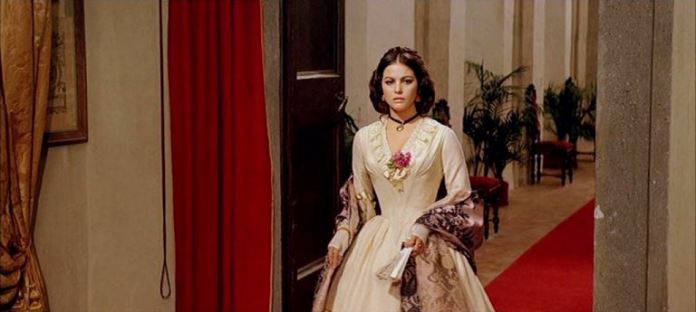
The Prince, partly out of a sense of clannish responsibility and partly with the pride of a frustrated father who finds his nephew a preferable avatar to any of his actual children, who are generally as dull and conservative as their mother, decides to take a hand in securing Tancredi’s future. The young man’s family fortune has been squandered, but the Prince knows now Tancredi’s charm and social cunning could gain him a truly important future if well-financed. The new lie of the land must be acknowledged and used to advantage: knowing Italy is being reconstructed to give greater power to a wealthy bourgeoisie who, in turn, are anxious to share the prestige of the old aristocracy, Fabrizio considers making Tancredi a match with an eligible daughter of the new, prosperous middle class. Soon, the perfect candidate presents herself: Angelica Sedara (Cardinale), daughter of Don Calogero Sedara (Paolo Stoppa), Fabrizio’s steward and now the Mayor of Donnafugata, who’s become rich carefully embezzling some of the Prince’s estate profits, and has used it to make himself a major landowner.

Angelica proves to be an astonishing beauty and a lively personality, one who makes the violation of class barriers all too easy for Tancredi. Only Concetta is infuriated by this potential match, appalled when Tancredi tells an embellished, suggestive tale about his wartime adventures as a naked play for Angelica’s attention. Tancredi’s attempt to help Cavriaghi supplant himself in Concetta’s affections is met with her disinterest. Although initially stricken by scruples at the thought of making a connection with Calogero, an ignoble type in both senses of the word, Fabrizio nonetheless supports Tancredi’s courtship of Angelica, and begins investigating her mystery, prying fact and legend out of his friend, the organist in the city church Don “Ciccio” Tumeo (Serge Reggiani). Ciccio tells the Prince that Calogero discovered Angelica’s mother in a peasant hovel, a fluke of nature blessed with impossible physical perfection but utterly animalistic in nature: Calogero snapped her up and now keeps under wraps in his villa, let out only for early morning prayers. Such is the strange path of genetic luck from the very bottom to the top of society.
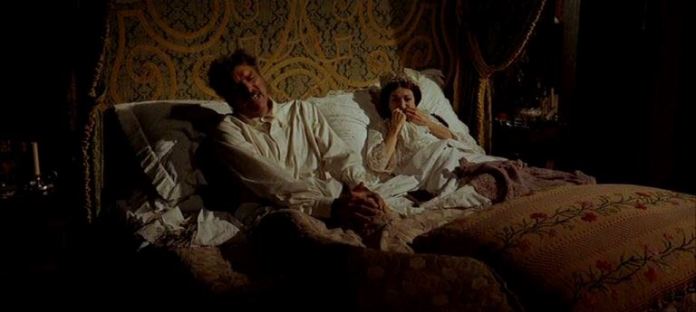
Carefully entwined with the political and social ruminations in The Leopard is a far more personal and intimate story, a confrontation with the strange ramifications that assail us in mortality, in a world and time carefully designed to keep careful checks and balances on such primal forces. Visconti and his post-neorealist followers, Pier Paolo Pasolini and Bernardo Bertolucci, were fascinated by the juncture of personal proclivity and social constructs, and Visconti wrestled with this nexus in many of his films. His most easily recognisable theme, that of family as a troubling embrace, is counterbalanced by this figuration, the eternal solitude of the unsatisfied being, and he eventually resolved it through taboo in his lunatic self-satire The Damned (1969). Here Prince Fabrizio’s physical lustiness is a part of him, an aspect he feels driven by but cannot express in his all-too-proper marriage—hence his irritable refusal to confess to Pirrone—and also plainly explains some of his fascination with Angelica. Yet this is also bound to a subtler sense of emotional frustration, which slowly emerges as Fabrizio lives to a certain extent vicariously in setting up the perfect match of Tancredi and Angelica, a union that comes to symbolise for him the ideal consummation of a new era as well as a dream of cavalier romanticism that he yearns to make real. Visconti underlines this by removing one significant aspect of the novel, where Concetta was doomed late in life to realise Tancredi always loved her; besides, Delon and Cardinale look too good to buy anything else. This is not to say Visconti idealises the young couple’s union himself: the degree to which the film plays up Tancredi’s dash and beauty only makes the sting of realising that in many ways he’s a callow and facetious figure all the more disturbing. Although Fabrizio is resolutely heterosexual, Visconti still finds definable queer self-expression through him as a figure wrestling with desires in secret (he even baits Pirrone with a dash of homoerotic humour to dry him after a bath).

Fabrizio’s hopes for Tancredi’s great career also reflects another kind of frustration, that of wasted capacities: class is a trap for its highest levels as well as its lowest. Fabrizio’s reputation is that of a gentleman scientist—he’s an astronomer who takes comfort in the serene peregrinations of the stars—but the Risorgimento brings the tormenting possibility of new uses of his gifts. A representative of the new state, Cavalier Chevalley (Leslie French), comes to Donnafugata to ask Fabrizio to become a senator, claiming his famous intellect and nobility are just the qualities the new country needs to help the great project of overcoming the awful stagnation that has gripped Italy in general and Sicily in particular. Fabrizio is polite with the bureaucrat, but turns him down, offering as an explanation his individual hesitations—his lack of real political and legislative knowledge for one, and, more importantly, his lack of the kind of blended sentiment and self-interest he thinks necessary for a politician—and also his social ones. His explanations frustrate Chevalley, for they contain a poeticism that eludes the technocratic progressivism of the bureaucrat, conceiving of Sicily as a place of people longing desperately for a long rest after centuries of being buffeted politically and socially by invaders and imposed cultures, full of raw humans who think themselves kings of the earth precisely because they remain so close to the earth, and so will resist being transformed into the kind of bourgeois moderns Chevalley means to make of them.

Fabrizio instead recommends Calogero, exemplar of a new breed of “jackals and hyenas” he sees supplanting the old lions and leopards of the aristocracy. This sequence transliterates much of Lampedusa’s prose into dialogue, but avoids becoming didactic by depicting Fabrizio’s attempt to articulate things he sees as true in a way he never has before with an intellectual force he’s too used to rounding off for less inquiring ears. Fabrizio remains something of a snob in spite of himself, but his snobbery has its uses, as it sensitises him to commonplace habits of democratic states: obfuscation, indulgence, self-promotion, and hypocrisy, whilst he knows his privilege has insulated him from any need to adopt such necessary skills. Visconti offers a great philosopher-hero but one who feels himself bound to what we call today the wrong side of history, even as he tries to give the right side a push.

The Leopard’s historical thesis is ambivalent in a manner that makes particular sense in contemplating Italian history, and the source of that ambivalence lies in the simultaneous closeness of Visconti and Lampedusa in their emotional intuition, and the disparity of their politics. Lampedusa was expressing, in part, his anguish with the state of his nation circa 1945 by trying to locate the crucial moment in the past that set it on this path. Visconti, for his part, has a prosecutorial eye for the same notion. His film depicts the advent of a new age, but finds it an unfinished revolution that left the nation with a fractured pseudo-democracy defined by the self-interested coalition that eventually augured in Fascism when its interests were threatened by post-World War I socialists. The vignette of the lynched official and its crucial parallel with the collapse of the Fascist regime points to a sense of inevitable repetition, the growth of corruption and oppression that will grip the state again and again just as men are born, grow old, and die—again twinning the personal and the political. The Prince’s contemplation of his mortality and inevitable decline mimics the wane of his class and his time.

The film’s funniest vignette depicts the events swirling around a plebiscite that will give the stamp of approval to the new state. Fabrizio, despite having championed the pro-unification vote, puts up with cheeky quips from some whilst being feted with scrupulous toadying by Calogero. Later, Calogero reads out the results of the election before an assembly of townsfolk, constantly cut off by an excitable brass band, much to Fabrizio’s entertainment. Eventually, Calogero manages to announce the results, a unanimous “yes” vote. Fabrizio later questions Ciccio, who angrily rants that he voted “no” because he still felt grateful to the former Bourbon Royal Family for financial aid, confirming what Fabrizio had already realised: the vote had been tampered with. Underneath the surface buffoonery and enthusiasm, the well was being poisoned. Democracy had already been subverted at the very moment of its inception.

Visconti, who hadn’t yet seen some of Lancaster’s more ambitious performances, initially decried being saddled with a cowboy (watching Judgment at Nuremberg, 1961, changed his mind), but this was actually one of the specific strengths Lancaster brought to the role (tellingly, his first choice for the part was Nikolai Cherkasov, who had played Alexander Nevsky and Ivan the Terrible for Eisenstein). For from being some effete relic, Lancaster’s height and strength imbue the Prince with a sense of physical power, harking back to some distant ancestor’s more direct use of such endowments to win the power his family is about to lose. Fabrizio literally towers above most of the rest of the cast, and casually picks up both Ciccio and Calogero. The bite of Fabrizio’s sense of impending mortality gains power precisely because he has such strength, evoking a classical sense of tragedy as life and death extract their price from everyone, even the titanic. When Pirrone makes him aware that Concetta has a crush on Tancredi, Fabrizio reacts angrily and then admits that realising his children are old enough for love has pushed old age on him suddenly.

Visconti’s sarcasm is deftly wound into the solemnity of the material, contemplating the exhaustion of the Prince’s interest in life not in the face of great trials or wrenching losses of more familiar epic fashion, but through a hundred petty annoyances and glimpses of unbearably paltry pathos. He’s not the only one: Visconti’s irony reaches a peak of quiet agony when he surveys the glumly doomed courtship of Cavriaghi and Concetta and then pans away to look over Donnafugata’s rooftops, Rota’s music rising to sublime raptures even as he contemplates the barrenness of the duo’s mismatched hopes (this moment also suggests Visconti annexing the dumbstruck distancing of Michelangelo Antonioni, as if suggesting right here is the seed of high modernism). Meanwhile Tancredi and Angelica stalk each other playfully in a grand old house Calogero has given them as part of a grand dowry, a cavernous space for foreplay littered with dusty paintings, leftovers of another age: decay is already overcoming the aristocracy, its wares falling into the hands of the Calogeros of the world. The temptation to ecstatic physical consummation grips Tancredi and Angelica, but he resists taking her virginity: Tancredi, ever the strategist, knows their game should be played by perfect rules for maximum effect.
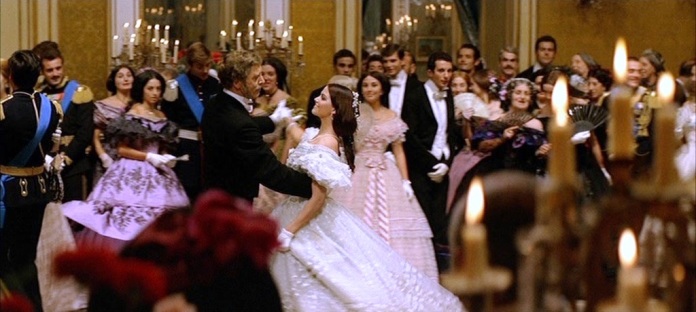
The film’s famous, lengthy, deceptively detached finale depicts the new settlement through social ritual. The grasping bourgeoisie are introduced to the fusty aristocracy on the dance floor. The soldier who has defeated Garibaldi in the field is feted as the man defending the new reasonableness. The well-matched young lovers enjoy their moment in the sun of society. The middle-aged Prince shows off his famous dancing skills and everyone is delighted he hasn’t lost his zest. Yet the sequence enfolds a series of quiet epiphanies defacing the surface glamour, as Fabrizio experiences a dark night of the soul in a bright, gay salon. He regrets having come to the party as soon as he arrives but knows he can’t leave now until early morning, and doomed to wander from station of private cross to station. He contemplates his own inevitable demise and the banality of the world about him, and sourly regards a room full of excitable daughters of the inbred nobility who remind him of a gang of monkeys. The Prince takes a verbal swipe at Garibaldi’s conqueror for his hypocritical declamations about defeating the General and then genuflecting to him, not understanding the political game that must now be honoured: Garibaldi has become a national hero, but the radicalism his movement stirred up must now be suppressed. A painting on the wall depicting a patriarch’s death fascinates him far more than the party, noting such morbid details as the deathbed sheets in the painting being too clean. Angelica and Tancredi swoop in to rescue him in a moment laced with evanescent, mysterious cues of unspoken understandings and concessions admitted amidst the trio. This leads to Fabrizio and Angelica performing a waltz before the assembled partygoers, an islet of perfect courtly grace and mutual admiration between the man and woman, new and old, kept in hypnotic motion as long as the dance goes on.
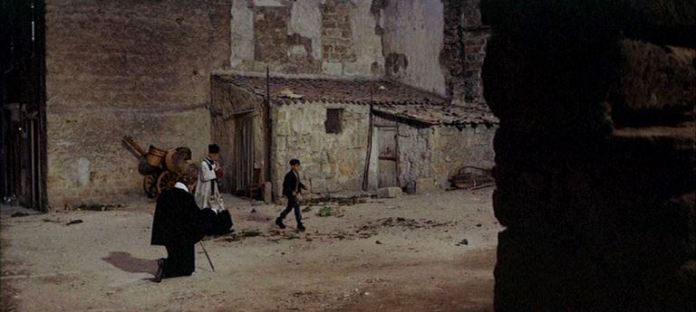
The deliberate tone of this sequence and its underlying mournfulness clearly anticipates the same mood in Visconti’s Death in Venice (1971), though Fabrizio’s anxiety is more ephemeral. The waltz gives way to the prancing jollity of a conga line, evoking, like the similar use of it in the finale of Fellini’s 8½ the same year, the ongoing absurdity and heedless motion of society. But whereas Fellini had his hero join in, Fabrizio remains detached. His daughter Concetta is revealed to be just as tragic a figure, upbraiding Tancredi not just for ignoring her, but also for revealing his smooth, smug acquiescence to the Way Things Are by approving of the upcoming execution of some revolutionaries. This last touch is one of Visconti’s more precise and caustic revisions of Lampedusa to set the seal on his parable as well as contrast the Prince’s musings. Whereas in the book the sight of slaughtered animals reminded Fabrizio all too keenly of the gross side of mortality, here the his long night reaches its end when he starts to walk home and hears gunshots signalling the executions. Meanwhile Tancredi grips Angelica all the tighter as they ride away in a carriage, and Calogero yawns and pronounces it a good thing. Fabrizio kneels down at the toll of Vespers and recalls Ciccio’s tale about the mysterious morning appearances of Angelica’s mother, and then whispers a questioning prayer to the stars, wondering when he might die and join them in their certitude. The film’s ultimate irony is the bitterest—the awareness that seemingly resilient, contemplative, complacent Prince is actually the frustrated dreamer of this crowd who have been busy arranging the world to suit themselves.

Beautiful text, very close to the heart of this fantastic film.
LikeLike
Why thank you Christoph.
LikeLike
I’d put this one off for its length many times, but finally watched it after seeing you’d written it up. It’s the kind of movie that makes me shudder at all the times I’ve told people I love history: I do love it, but I know so little of it. Armed with only a quick reading from Wikipedia’s Garibaldi page, I launched into the film. While much of the nuance of the war eluded me (Visconti made it easy to follow generally) I was caught up in the tension in Fabrizio’s allegiance to what got him to his position of power and his understanding of the need to cede to the future. Or, as you put it so well, “Visconti offers a great philosopher-hero but one who feels himself bound to what we call today the wrong side of history, even as he tries to give the right side a push.” The last half hour is what I’ll remember, the floating sense of dread and resignation, watching the huge Fabrizio nearly flop into a chair in the midst of the party swirling around him, a man exhausted by his sweating recognition of the “dismal tide” coming to replace his leopards and lions with jackals and hyenas. The rejection speech to Chevalley’s offer is poetry, and one of the best performances I’ve seen Lancaster give – meaning, several times in that last half hour, I forgot I was watching Lancaster (the Italian dubbing helps). It’s now been a couple days since I watched it, and I can’t shake it. I don’t pretend to get it all, but its power as a metaphor for the inevitability of corruption is undeniable, and moving. Your essay, reading it after watching, is a retro-education. Extremely well writ, as always, and illuminating for the less historically literate like me.
LikeLike
Rob, I’m glad that a) you’ve now seen this and b) that you got so much from it. Indeed, I was similarly uncertain of the political frame when I first saw it, but also that frame is irrelevant in some ways; we just see that it’s the old story of changing times and the pragmatic and cynical and romantic reactions we have to them. It’s a story of a common point of history in just about every society on Earth in the past 100-200 years, the collapse of a settled aristocracy and the rise of new forces. One thing I particularly admire is how Visconti makes us see, as you note, through the Prince’s eyes and contemplate the obnoxious side of the new society, but without seeming facile or reactionary. Instead, it’s almost painfully clear-eyed and trusts us to recognise it, in contemplating the weaknesses of our own time.
And yeah, Lancaster is really damn good in the film even though we don’t hear his voice; he’s still hypnotic, his careful gestures, his eyes. He’s similar to Anthony Quinn in La Strada; he almost seems most himself when dubbed in Italian.
LikeLike
That last observation is right on the money. I love watching Lancaster in pretty much anything he’s in. Every part of him is sculpted to attract all the energy toward him in any room – but I’ve always had trouble believing him. His clipped diction is a liability to his authenticity. Conversely, the way he speaks is part of the greatness of characters like Gantry, the general in 7 Days in May, Hunsecker, and any other “bad guy” he’s played, perhaps because the way he speaks puts him at a necessary distance from the truth (surely there’s a better way to say that). I started watching The Leopard years ago – can’t tell you exactly what made me turn it off, but it was the version with his own voice, and maybe I just couldn’t warm to him, and by extension the movie. But in Italian, you can’t take your eyes OR your ears off him.
LikeLike
Actually I believe that the voice you hear the English-language version of The Leopard is not Lancaster’s either.
But yeah, there was a stylisation about Lancaster’s performing style that was peculiar and served him best playing highly articulate bullshit artists. Both his body and his voice had a jerky muscularity barely contained by the niceties of acting. Towards the start of his career, anyway; as he matured, and I think The Leopard marks the most definite pivot in his maturation, he became more naturalistic. You don’t notice “Lancaster” at all in The Train or Castle Keep or Ulzana’s Raid or Atlantic City; he just is (there’s still some artificiality to him in Seven Days in May, but it suits the character there, as a uniform in search of an identity). Perhaps playing an overtly theatrical being like Elmer Gantry helped him shake that quality off.
LikeLike